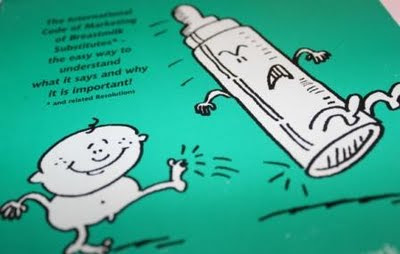Many choose breastfeeding because it’s a baby’s most perfect food. But our milk is more than just food. Even well after our children have finished their “mommy meals” and their hunger is satisfied, our milk continues to provide for them in numerous ways.
Our milk is an
on-call body guard
It’s a true mercy from Allah that the moment our children
are born our milk is there to help protect them from infection, disease, and
illness.
The first bit of milk we get, colostrum, coats and seals our
child’s intestines so germs and bacteria don’t make him sick. It also helps to
clear his body of excess waste that he accumulated in the womb. If he’s born
jaundiced, colostrum will help clear that too!
MashaAllah, as time goes by our milk will provide ongoing
infection protection for our children at every single feed. Each time our child
is exposed to germs (from the air, from the floor, from a sick relative or
fellow playmate) she’ll transfer those germs to us when she breastfeeds.
Immediately, our body will produce antibodies to fight that germ and then pass them
back to her through our milk, helping to keep her strong and healthy.
Our milk helps protect our bodies too. From the first day our
babies are born, breastfeeding lessens mom’s risk of hemorrhaging and helps
balance out our hormones, reducing the risk of post-partum depression. The more
we breastfeed, the more our bodies benefit. Breastfeeding has been shown to
help protect women against various cancers (breast and cervical to name two),
naturally help space children, and even speed up post-baby weight loss!
Our milk is a safe
haven
Breastfeeding babes know that there’s no comfort object
quite like mommy’s milk. Whether it’s used to soothe trauma from a bad fall, crankiness
from a recent illness, or anxiety over life’s many changes, our breastmilk is always
there to help our little ones feel okay again.
The real beauty of breastfeeding our children through
stressful times is that it provides us moms with comfort too! How relaxing it
is for us to watch our children’s upset cries fade to content smiles with just
a few suckles at the breast. How comforting to look down after a feed and see
our children calmly (and deeply) sleeping without a worry in the world.
And unlike other comfort objects (such as toys, dolls or
dummies) our breastmilk can never get lost in a mess, forgotten about in a
rush, or worn down after years of wear and tear. As long as we choose to
breastfeed, our milk will be there to help provide a safe space for our
children when they need it.
Our milk is an
ever-lasting connection
It’s no coincidence that babies can smell their mother’s
unique milk scent and are more attracted to it over other smells.
Divine design made our breastmilk smell similar to that of
our amniotic fluid which housed baby during his time in our womb. When baby is
born, his familiarity with our smell helps him to search for our breasts when
he gets hungry, a newborn reflex called ‘rooting’.
With every feed that baby takes from the breast, the hormone
oxytocin is released into our bloodstream, increasing the feelings of love and
attachment to our children. This process sets the foundation for a uniquely
strong and caring bond between mother and child.
The bond between breastfeeding child and mother is so strong
that in Islam any breastfeeding child under two years of age can forever be considered
the son or daughter of the woman who breastfeeds him or her, a process known as
Tahrim (creating mahram relationships through breastfeeding).
Our milk is an
inspiration
Breastfeeding didn’t begin with us.
Allah, subhana wa ta ala, mentions the mother of Musa,
alayhi salam, who suckled her son before sending him down river to save his
life (Qur’an, 28:7).
Prophet Ismaeel, alayhi salaam, was breastfed by his mother
Hajar before she climbed Mt Marwa and Mt Safa to look for water (Sahih
Bukhari).
The Prophet Muhammad himself, sallallahu alayhi wa sallam,
was breastfed in his childhood by a wet-nurse named Haleemah (The Sealed
Nectar). Later, his daughter Fatima, radiAllahu anha, was breastfed by her
mother Khadija bint Khuwayylid, radiAllahu anha (Great Women of Islam).
I like to think that every time we breastfeed, we’re
continuing the legacy these great women left behind. And every time our older
children see us breastfeeding the younger ones, we’re setting the example for this
legacy to be carried forward after we’re gone, inshaAllah.
Our milk is so much more than just food! It’s nourishment
for the whole family; unbreakable bonding for mother and child; and when done
with the intention to please Allah, it can even be an act of worship to better
our souls.







